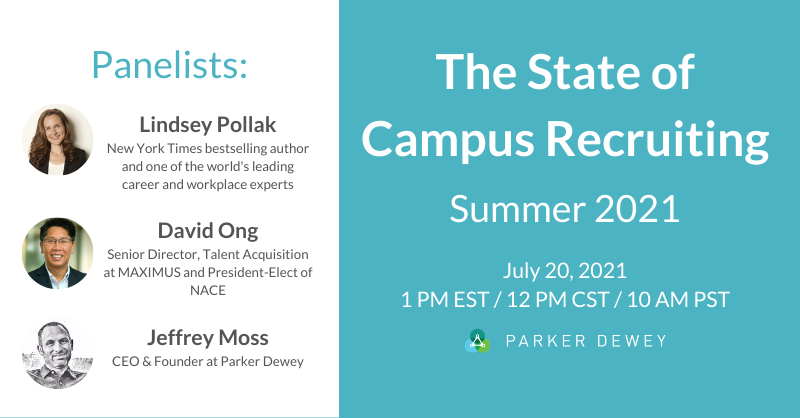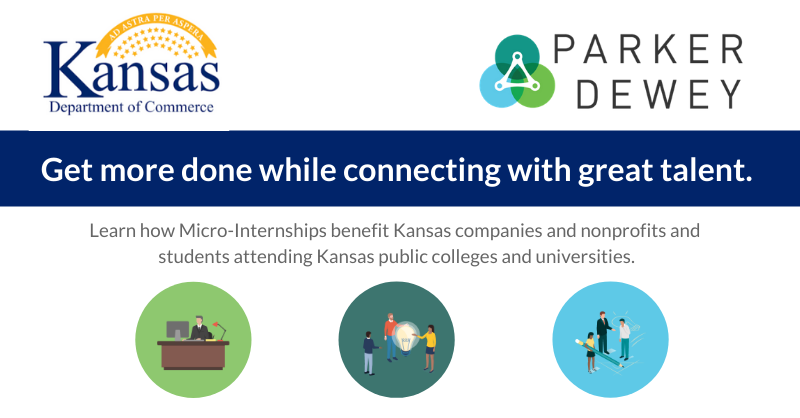.png)
On Competing for Top Talent While Keeping Your Existing Team
While companies often think about employee retention, it often isn’t considered in the context of campus recruiting. It should be, especially right now as the U.S. Chamber of Commerce's blog highlights that "The data suggests that workers are highly confident they can leave their current job for something better, and that there are many good jobs available for the taking." While so much of our attention is on recruiting right now, are we doing enough to retain talent when we find them?
And these retention trends aren’t just about keeping employees with years of experience, but are also impacting campus recruiting. We’ve known for years now that 55.3% of college graduates leave their first job within the first year, and while fit has always been important, unlike prior generations, recent grads are constantly inundated with reasons why they should be unhappy at their job. Without having the context to understand that the grass is not always greener, career launchers are much more willing to quit for a new opportunity when they perceive greener pastures. As a result, companies are increasingly holding campus recruiting professionals accountable not just for hiring outcomes, but also the retention of those new hires.
As you gear up for the 21-22 campus recruiting season, what can you do to not just compete for top talent, but also keep the team you’re working so hard to build? For some ideas and inspiration, join us on July 20th for our quarterly State of Campus Recruiting call. This quarter we’re excited to be joined by New York Times bestselling author and one of the world's leading career and workplace experts, Lindsey Pollack, and Senior Director, Talent Acquisition at MAXIMUS and President-Elect of NACE, David Ong.
Both Lindsey and David bring a wealth of experience and perspectives on how innovative teams are engaging college students to enhance the hiring experience and build lasting relationships with early-career candidates.
For more ideas you can put into action right now, check out this week's highlighted articles and more details on our upcoming webinar.
Michele Aymold, Vice President
Upcoming Webinar

Join us for our summer edition of The State of Campus Recruiting! We'll continue on our recent theme of "reinventing university recruiting," and discuss what emerging talent is looking for after a year+ of disruption, how companies are responding to the call for more remote opportunities, and employer branding to attract talent across generations.
Articles of the Week
Let’s Not Turn Community Colleges into Workforce Development - The Hechinger Report
Increasing Career Opportunities Through Experiential Learning - Inside Higher Ed
Student Success: Lily’s Kansas Micro-Internships - Parker Dewey
Let’s Not Turn Community Colleges into Workforce Development - The Hechinger Report
“Biden is following through on a point he began making in 2014, that community colleges should be vehicles for training the workforce of the future. Yet there is another point Biden may be in danger of missing: If our education system hopes to fully prepare citizens for our democracy...a liberal education must be supported as strongly as job training programs.”
The Biden-Harris administration is allocating more funds to community colleges, specifically to promote job training. And while this means community college leaders can expand job training programs “with lightning speed,” the Hechinger Report also notes that “workforce training should not preclude preparing students in other ways” through a robust liberal arts curriculum—key to helping career launchers build crucial core skill sets. And at Parker Dewey, our 33 (and counting) community college partnerships empower students to develop both core and hard skills through hands-on project experiences.
Related reading: How professional experiences support post-graduation success
Increasing Career Opportunities Through Experiential Learning - Inside Higher Ed
“Firsthand experience has been identified as one of the most critical factors when graduate students make their career choice. Such direct experiences can help graduate students recognize their existing skills and abilities and discover various new ways to apply them outside academe.”
While Parker Dewey’s platform is especially popular among undergrads and recent grads, experiential learning can be just as impactful and useful for graduate students. This article explores the benefits of experiential learning for pursuing higher-level degrees, plus how hands-on experiences like Micro-Internships can also benefit higher education administrators.
Related reading: Connecting with Students Through Experiential Recruiting
Student Success: Lily’s Kansas Micro-Internships - Parker Dewey
“Throughout her projects, Lily has strived to build both technical skills and core skills, especially relationship building— she's aimed to ‘actually get to know the company’ she's working for.”
Meet Lily, a rising junior at Kansas State University selected for seven Micro-Internships. We chatted with Lily about the Kansas Micro-Internship Program, how her academic coursework has connected with her hands-on project experiences, and her advice for companies considering Micro-Internships.
And for states or communities looking to improve college-to-career pathways, retain talent, and support local companies, the innovative Kansas program and its Micro-Grants provide a great roadmap.
Related reading: Career Launcher Success Stories
For more stories and insights on HR, recruiting, and diversity, click here to subscribe to our weekly newsletter Hire Learnings.



.png)

